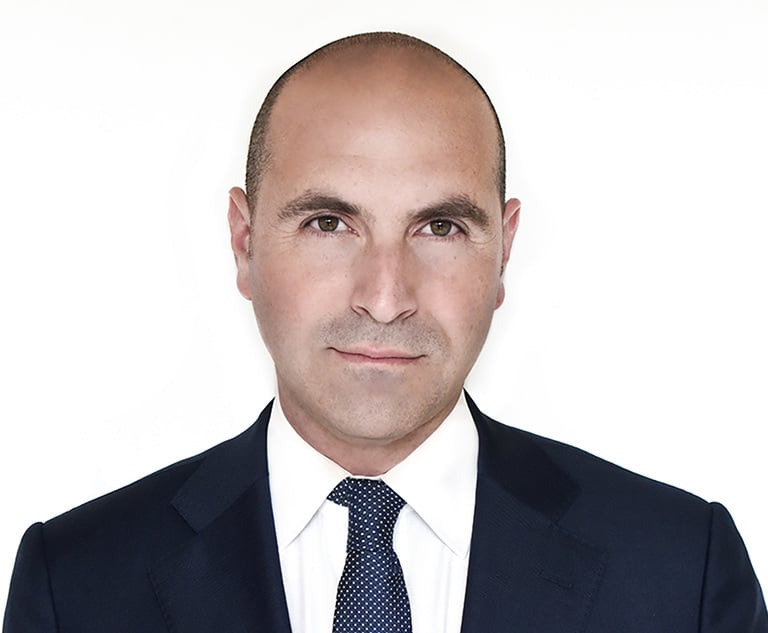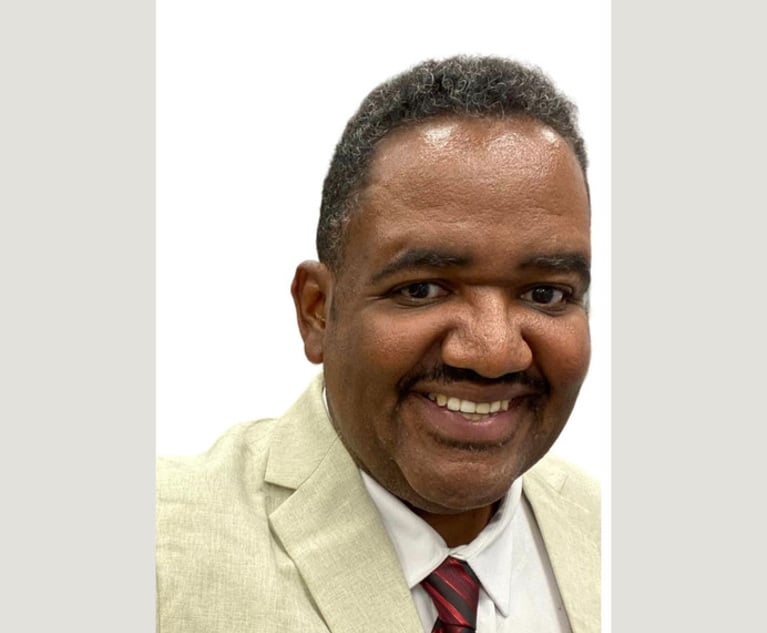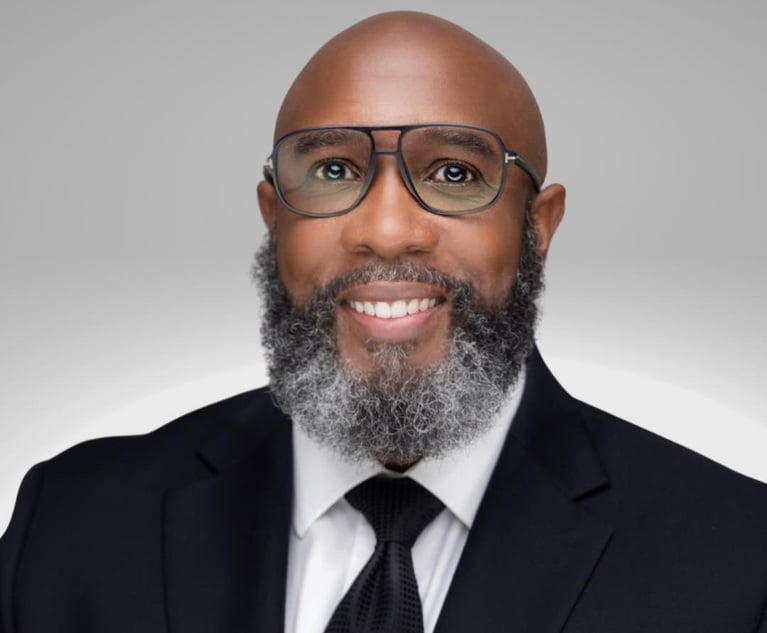The Guardian: How Judge Ginger Lerner-Wren Protects Broward's Most Vulnerable
Lerner-Wren doesn't choose between jurist or advocate, because she is both.
May 15, 2018 at 12:24 PM
6 minute read

With animated hands punctuating her speech, Broward County Judge Ginger Lerner-Wren seems more passionate and forceful than the typical black-robed jurist presiding over a courtroom from an elevated bench.
When she speaks, she still sounds like the woman she was decades ago: the former director of the Office of the Public Guardian, who once traveled across the state to advocate for patients at a psychiatric hospital on the brink of closure.
Back then, Lerner-Wren established herself as a staunch protector and formidable champion, staving off abuse and neglect for thousands in Broward County and across Florida.
Now, more than 30 years later and despite her elevation to the bench, she is still the guardian, straddling two worlds and creating a “court of refuge” for mentally ill defendants facing either imprisonment or care.
Since 2000, the court she presides over has diverted more than 20,000 people with mental illness from the county jail, where they faced criminal charges for misdemeanor offenses. Instead of a system that would give jail time, for instance, to schizophrenics charged with disruptive behavior in public, Lerner-Wren is at the center of a post-booking diversionary strategy that decriminalizes mental illness.
The idea is to administer justice to offenders facing unique circumstances and work with community agencies to deliver medical care, instead of criminal convictions.
“It's the matter of humanizing the law,” she said. “When you do that, the … forces in the courtroom shift.”
'Was There Nothing I Could Do?'
That shift has benefited tens of thousands, and the judge collects some of the stories as anonymous vignettes in her new book, “A Court of Refuge: Stories from the Bench of America's First Mental Health Court.”
The book provides an unprecedented look inside the courtroom. In it, Lerner-Wren tells one poignant and heartbreaking tale after another. In one story, a mother having a mental breakdown walks out of her house and into homelessness, leaving behind her husband, young children and property she'd purchased after working 15 years as a restaurant manager.
In another, a woman spirals from wearing tailored suits and high-heel shoes to getting caught in the rain wearing cardboard on her feet and having an explosive confrontation with police. Lerner-Wren saw the encounter as she drove past with her children. She recognized the woman, and pulled over to help.
“I had a sinking feeling,” she wrote in the book. “She had been to the mental health court years before and that hadn't led to a healthier life. Was there nothing I could do to help her?”
The questions and her actions that day paint a vivid picture of Lerner-Wren and make one thing clear: This is a woman who never chose between being a jurist and an advocate, because in her heart, she is still both.
“She has done a job that no other judge in Broward County could have done,” said Broward Public Defender Howard Finkelstein. “When you are blazing the path, when there is no blueprint, you have to make hundreds of decisions every day. As far as I can tell, she took something that never was and made it into something that everybody wants. And that's amazing.”
Before Lerner-Wren helped pioneer the mental health court, Finkelstein described a cruel system for dealing with a vulnerable population.
'When you ask me if Judge Wren and the court has made a difference, the difference is night and day,” he said. “The court has dramatically changed the lives of thousands and thousands of people. … It was very common to beat [mentally ill persons], throw them in a van, let them sit in the heat and then drive at break-neck speeds around the county. That was what the police used to call shake and bake. … It was cruelty for cruelty's sake.”
That started to change with a humanitarian keeping watch.
'Abiding Belief'
Months after Lerner-Wren took the bench in 1997, Broward's then-Chief Circuit Judge Dale Ross tapped her to create the nation's first Mental Health Court.
The court was an outgrowth of a scathing grand jury report that described the county's mental health system as “deplorable.”
Court administrators convened a task force, spearheaded by Judge Mark A. Speiser and Finkelstein, who pushed for a system unlike any other in the country.
“We literally took a court of law and we reversed it,” Lerner-Wren said. “It moved individuals who were arrested on low-level crimes out of an inappropriate system of care—the jail—into a more appropriate system of health care.”
Since then, Broward has become the national model, and Lerner-Wren has earned widespread recognition and credit for helping to replicate the effort across 250 mental health courts across the U.S.
But at the time, Lerner-Wren had just finished a stint as guardian and had worked as counsel tasked with protection and advocacy through the agency that later became Disability Rights Florida. The chief judge thought she was the right fit for the pioneering venture.
“It was as if all these pieces somehow conflated,” Lerner-Wren said. “We thought like painting a jet in mid-air, we would just figure it out. I looked at it at the time as a leap of faith — a court of conscience. If it didn't work, at least the family members would know that there was a judge who was standing up for them against the injustices of mental illness.”
Some of the country's foremost mental health experts and therapeutic justice advocates partnered to support the fledgling venture.
“We have an abiding belief in recovery,” she said. “People diagnosed with mental health conditions have the capacity to pursue their dreams and their professional lives. They deserve dignity and are entitled to the full breadth of their legal rights under the law. Every individual has worth and should have the opportunity to reach their human potential in this life within the community.”
Lerner-Wren said that she has never forgotten her work to benefit psychiatric patients.
“My time spent at the state hospital working on behalf of the residents there, that was a difficult tour of duty,” she said. “This is a healing tour of duty.”
This content has been archived. It is available through our partners, LexisNexis® and Bloomberg Law.
To view this content, please continue to their sites.
Not a Lexis Subscriber?
Subscribe Now
Not a Bloomberg Law Subscriber?
Subscribe Now
NOT FOR REPRINT
© 2025 ALM Global, LLC, All Rights Reserved. Request academic re-use from www.copyright.com. All other uses, submit a request to [email protected]. For more information visit Asset & Logo Licensing.
You Might Like
View All
Growing Referral Network, Alternative Fees Have This Ex-Big Law’s Atty’s Bankruptcy Practice Soaring
5 minute read
Against the Odds: Voters Elect Woody Clermont to the Broward Judicial Bench
4 minute read
Miami Civil Judge Myriam Lehr to Say Goodbye to the County Court Bench
4 minute readTrending Stories
- 1U.S. Eleventh Circuit Remands Helms-Burton Trafficking Case Involving Confiscated Cuban Port
- 2Can Passive Technology Change the Impaired Driving Trajectory?
- 3Bradley Arant, Moore & Van Allen Join Partner Promotions Parade
- 47th Circ. Rejects Liability Claims Against Freight Broker's Hiring Choices
- 5Sullivan & Cromwell Signals 5-Day RTO Expectation as Law Firms Remain Split on Optimal Attendance
Who Got The Work
Michael G. Bongiorno, Andrew Scott Dulberg and Elizabeth E. Driscoll from Wilmer Cutler Pickering Hale and Dorr have stepped in to represent Symbotic Inc., an A.I.-enabled technology platform that focuses on increasing supply chain efficiency, and other defendants in a pending shareholder derivative lawsuit. The case, filed Oct. 2 in Massachusetts District Court by the Brown Law Firm on behalf of Stephen Austen, accuses certain officers and directors of misleading investors in regard to Symbotic's potential for margin growth by failing to disclose that the company was not equipped to timely deploy its systems or manage expenses through project delays. The case, assigned to U.S. District Judge Nathaniel M. Gorton, is 1:24-cv-12522, Austen v. Cohen et al.
Who Got The Work
Edmund Polubinski and Marie Killmond of Davis Polk & Wardwell have entered appearances for data platform software development company MongoDB and other defendants in a pending shareholder derivative lawsuit. The action, filed Oct. 7 in New York Southern District Court by the Brown Law Firm, accuses the company's directors and/or officers of falsely expressing confidence in the company’s restructuring of its sales incentive plan and downplaying the severity of decreases in its upfront commitments. The case is 1:24-cv-07594, Roy v. Ittycheria et al.
Who Got The Work
Amy O. Bruchs and Kurt F. Ellison of Michael Best & Friedrich have entered appearances for Epic Systems Corp. in a pending employment discrimination lawsuit. The suit was filed Sept. 7 in Wisconsin Western District Court by Levine Eisberner LLC and Siri & Glimstad on behalf of a project manager who claims that he was wrongfully terminated after applying for a religious exemption to the defendant's COVID-19 vaccine mandate. The case, assigned to U.S. Magistrate Judge Anita Marie Boor, is 3:24-cv-00630, Secker, Nathan v. Epic Systems Corporation.
Who Got The Work
David X. Sullivan, Thomas J. Finn and Gregory A. Hall from McCarter & English have entered appearances for Sunrun Installation Services in a pending civil rights lawsuit. The complaint was filed Sept. 4 in Connecticut District Court by attorney Robert M. Berke on behalf of former employee George Edward Steins, who was arrested and charged with employing an unregistered home improvement salesperson. The complaint alleges that had Sunrun informed the Connecticut Department of Consumer Protection that the plaintiff's employment had ended in 2017 and that he no longer held Sunrun's home improvement contractor license, he would not have been hit with charges, which were dismissed in May 2024. The case, assigned to U.S. District Judge Jeffrey A. Meyer, is 3:24-cv-01423, Steins v. Sunrun, Inc. et al.
Who Got The Work
Greenberg Traurig shareholder Joshua L. Raskin has entered an appearance for boohoo.com UK Ltd. in a pending patent infringement lawsuit. The suit, filed Sept. 3 in Texas Eastern District Court by Rozier Hardt McDonough on behalf of Alto Dynamics, asserts five patents related to an online shopping platform. The case, assigned to U.S. District Judge Rodney Gilstrap, is 2:24-cv-00719, Alto Dynamics, LLC v. boohoo.com UK Limited.
Featured Firms
Law Offices of Gary Martin Hays & Associates, P.C.
(470) 294-1674
Law Offices of Mark E. Salomone
(857) 444-6468
Smith & Hassler
(713) 739-1250







